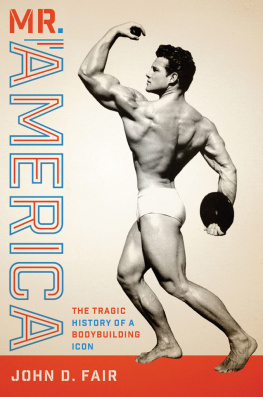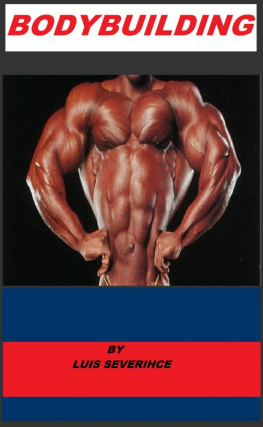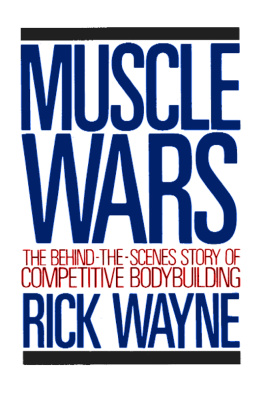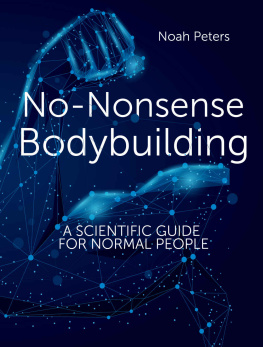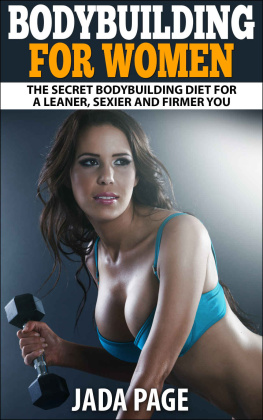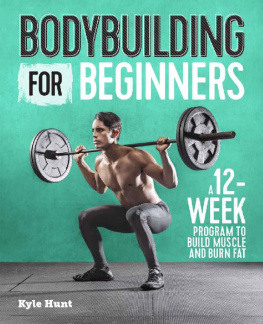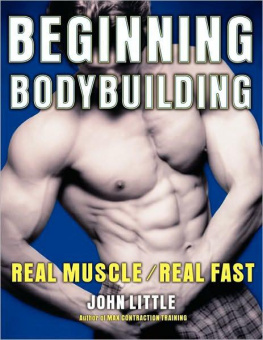John D. Fair - Mr. America: The Tragic History of a Bodybuilding Icon
Here you can read online John D. Fair - Mr. America: The Tragic History of a Bodybuilding Icon full text of the book (entire story) in english for free. Download pdf and epub, get meaning, cover and reviews about this ebook. year: 2015, publisher: University of Texas Press, genre: Science. Description of the work, (preface) as well as reviews are available. Best literature library LitArk.com created for fans of good reading and offers a wide selection of genres:
Romance novel
Science fiction
Adventure
Detective
Science
History
Home and family
Prose
Art
Politics
Computer
Non-fiction
Religion
Business
Children
Humor
Choose a favorite category and find really read worthwhile books. Enjoy immersion in the world of imagination, feel the emotions of the characters or learn something new for yourself, make an fascinating discovery.
- Book:Mr. America: The Tragic History of a Bodybuilding Icon
- Author:
- Publisher:University of Texas Press
- Genre:
- Year:2015
- Rating:5 / 5
- Favourites:Add to favourites
- Your mark:
- 100
- 1
- 2
- 3
- 4
- 5
Mr. America: The Tragic History of a Bodybuilding Icon: summary, description and annotation
We offer to read an annotation, description, summary or preface (depends on what the author of the book "Mr. America: The Tragic History of a Bodybuilding Icon" wrote himself). If you haven't found the necessary information about the book — write in the comments, we will try to find it.
Drawing on unique archival documents and fascinating interviews, an acclaimed sports historian delivers the first comprehensive examination of Mr. America, the iconic bodybuilding contest that honored ancient ideals while defining masculinity during the competitions heyday in the 1950s.
John D. Fair: author's other books
Who wrote Mr. America: The Tragic History of a Bodybuilding Icon? Find out the surname, the name of the author of the book and a list of all author's works by series.
Mr. America: The Tragic History of a Bodybuilding Icon — read online for free the complete book (whole text) full work
Below is the text of the book, divided by pages. System saving the place of the last page read, allows you to conveniently read the book "Mr. America: The Tragic History of a Bodybuilding Icon" online for free, without having to search again every time where you left off. Put a bookmark, and you can go to the page where you finished reading at any time.
Font size:
Interval:
Bookmark:
Terry and Jan Todd Series on Physical Culture and Sports
MR. AMERICA
THE TRAGIC HISTORY OF A BODYBUILDING ICON
John D. Fair

University of Texas Press
Austin
Copyright 2015 by the University of Texas Press
All rights reserved
First edition, 2015
Requests for permission to reproduce material from this work should be sent to:
Permissions
University of Texas Press
P.O. Box 7819
Austin, TX 78713-7819
http://utpress.utexas.edu/index.php/rp-form
Library of Congress Cataloging-in-Publication Data
Fair, John D.
Mr. America : the tragic history of a bodybuilding icon / John D. Fair. First edition.
pages cm. (Terry and Jan Todd series on Physical Culture and Sports)
Includes bibliographical references and index.
ISBN 978-0-292-76082-0 (cloth : alk. paper)
1. BodybuildingCompetitionsUnited StatesHistory20th century. I. Title. II. Title: Mister America.
GV546.5.F35 2015
796.41dc23 2014007953
doi:10.7560/760820
ISBN 978-0-292-76749-2 (library e-book)
ISBN 9780292767492 (individual e-book)
To John Hordines, who started it all
PREFACE
ALL HISTORY IS ABOUT BODIES AND NOTHING CAN BE WRITTEN OR UNDERSTOOD OUTSIDE OF BODILY EXPERIENCE.
MICHAEL ANTON BUDD, THE SCULPTURE MACHINE
IN 1970, JON ALEXANDER, A HISTORY PROFESSOR AT TEMPLE UNIVERSITY, complained to the editor of Muscular Development, a leading muscle magazine published by the York Barbell Company, that while the Philadelphia Free Library contained over five million volumes, it had only a few books on weightlifting and virtually nothing on the history of bodybuilding. He wanted to know whether any study had ever traced the history of the sport from its inception to the present. Bob Hoffman, the companys founder and the iron games most formidable personality at the time, suggested his own Secrets of Strength and Development; though this rambling text was hardly a history, its author recommended the book as the nearest thing to the sort of study that Alexander had requested.
Nor have women been neglected. In Bodymakers, Leslie Heywood analyzes the iconography of womens bodybuilding from a feminist perspective, and Maria Lowes Women of Steel reckons with the conundrum of balancing muscular development against femininity. Their appearance coincided with a burgeoning scholarly interest in the body at the end of the twentieth century. And Jan Todds Physical Culture and the Body Beautiful, a study of nineteenth-century women, has provided a firm foundation for future research. It is hardly the same sport that Webster showcased a generation ago.
So extensive has the corpus of bodybuilding literature become that Emily Nussbaum recognized it as an independent field of scholarship in a 1998 Lingua Franca article entitled Bodies That Matter: Bodybuilding and weightlifting studies fit right into several current academic trends: the hot new field of sports history and sociology, body studies in general, and queer and feminist explorations of androgyny and gender bending. None of these publications, however, provides more than scant coverage on the twentieth centurys arguably most important physique title, Mr. America.
Mark Adams wrote a biography of Bernarr Macfadden entitled Mr. America (2009), yet Macfadden never held the title of Mr. America, and neither the title nor the contest is mentioned anywhere in the book.
Whatever shortcomings might exist in the present account, every effort has been made to incorporate original source material accompanied by full documentation and an interpretive focus. This is done on three levels. The basic framework is drawn from the many so-called muscle magazinesfrom Macfaddens Physical Culture, founded in 1899, to such current publications as Iron Man, Muscle & Fitness, and MuscleMag International. Though not without flaws of bias and omission, these magazines provide accounts of physique contests and related developments as they occurred. Supplementing these accounts is a mixture of other printed material, largely historical, biographical, and sociological, that offers access to other primary sources and viewpoints.
To fill the many gaps in printed material intended for public consumption, this study includes information from private interviews with scores of individuals associated with the iron game. Like other original sources, however, the interviews must be treated with caution. Most interviewees lived through only a portion of the period covered, and virtually none experienced the earliest decades. Furthermore, memory is a tricky medium. Subjects are often forgetful, and their recollections can be selective, misleading, or just wrong, in part because the often-irresistible opportunity to shape history to their advantage can lead them to place themselves in a favorable light and depict their adversaries as evil or misguided. Therefore, it is desirable to double- or triple-check stories with as many individuals as possible. To this end, I am indebted to the following persons, who graciously subjected themselves to my queries (asterisks indicate Mr. America title winners): Joe Abbenda*, Dale Adrian*, Jules Bacon*, John Balik, Clarence Bass, Bob Bendel, Vic Boff, Bob Bonham, Leonard Bosland, Howard Bovell, Richard Cavaler, David Chapman, Boyer Coe*, Bill Colonna, Bob Crist, Jerry Daniels*, Dave Davis, John DeCola*, Jan Dellinger, Bob Delmontique, Louis DeMarco, Wayne DeMilia, Chris Dickerson*, Mauro Di Pasquale, Dave Draper*, Alton Eliason, Neva Fickling, Kelvin Fountano, Warren Frederick*, Max Furek, Frances Gajkowski, David Gentle, Mike Graham, Bill Grant*, John Grimek*, Fairfax Hackley, Terry Hairston*, Josh Henson, Norman Hibbert, Sylvia Hibbert, John Hoffman, John Hordines, Dan Howard, Don Howorth*, Gene Jantzen, Harry Johnson*, Ted Karnezis, Bob Kennedy, Faye King, Jack King, Joan Klisanin, Steve Klisanin*, Charles Kochakian, Zabo Kozewski, Lloyd Red Lerille*, Jim Lorimer, Dan Lurie, Ian MacQueen, Tom Manfre, Steve Michalik*, Pete Miller, Gene Mozee, Jim Murray, David Lee Nall, Jack OBleness, Tommy OHare, Emmanuel Orlick, Jim Park*, Charlotte Parker, Joel Parker, Jimmy Payne*, Bill Pearl*, Joe Peters, Jon Rieger, Ken Rosa, Rudy Sablo, Elmo Santiago, Cliff Sawyer, Matt Shepley, Dick Smith, Harry Smith, Ken Sprague, Bill Starr, Leo Stern, Tommy Suggs, Armand Tanny*, John Terpak, Joe Tete, Terry Todd, Val Vasilieff*, Vern Weaver*, David Webster, Malcolm Whyatt, Kim Wood, Fred Yale, Chester Yorton*, and Frank Zane*. This list includes twenty-five former Mr. Americas, constituting 26 percent of the ninety-seven persons interviewed, which ensures at least some degree of authenticity.
The various extant documents, manuscripts, and photographs from the period have proved to be the most reliable source of information, but only a small fraction of such material has survived. Most people involved in the sport have thrown away items relating to their participation, perceiving them as clutter, but I nevertheless asked nearly all those I interviewed whether they had saved anything of this nature. I am particularly grateful to Dr. Jon Rieger, a professor of sociology at the University of Louisville, who had the presence of mind to save his records and donate them to me for this project. They filled a giant information void for the final two decades of the Mr. America Contest, which was no longer receiving much coverage in the muscle media. Moreover, I have been able to rely on the resources I gathered for Muscletown and other projects over the years, items that collectively constitute the Hoffman Papers and other collections in my possession. This study also relies heavily on the enormous archive housed in the H. J. Lutcher Stark Center for Physical Culture and Sports at the University of Texas. For providing full access to this incomparable resource and for their invaluable counsel, support, and friendship over many years, I am indebted to Jan and Terry Todd and members of their staff.
Next pageFont size:
Interval:
Bookmark:
Similar books «Mr. America: The Tragic History of a Bodybuilding Icon»
Look at similar books to Mr. America: The Tragic History of a Bodybuilding Icon. We have selected literature similar in name and meaning in the hope of providing readers with more options to find new, interesting, not yet read works.
Discussion, reviews of the book Mr. America: The Tragic History of a Bodybuilding Icon and just readers' own opinions. Leave your comments, write what you think about the work, its meaning or the main characters. Specify what exactly you liked and what you didn't like, and why you think so.

